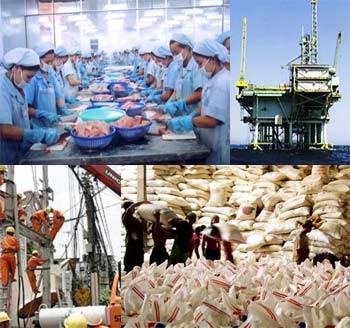(VOVworld) - The revised 1992 Constitution has several changes to stipulations on economics drawing the attention of economists, and enterprises. VOV summarizes opinions on this issue.
 |
Article 54 of the revised 1992 Constitution stipulates the nature of economic sectors but doesn’t specify the name of each economic sector. Economists say the changes reflect the characteristics of the socialist-oriented market economy. This means all economic sectors are equal, with none playing a leading role. Accordingly, the Vietnamese economy is a socialist-oriented market economy with different types of economic ownership and sectors. Vice President of Viet Duc Steel Group Nguyen Ngoc Bao says that the equality between economic sectors will help mobilize the sustainable strength of the economy, increase capital and ensure efficiency for enterprises and the national economy. Nguyen Ngoc Bao says: “It’s a good sign that the constitutional revisions don’t specify any economic sectors. Because when we name them specifically, each will receive different treatment. The changes demonstrate that all economic sectors have equal responsibility before the law and are subject to a sole obligation. The state ensures their rights and all economic sectors are obliged to work according to the law”.
According to Dang The Vinh, Vice Head of the Economics Committee of the National Assembly, it’s important for the revised Constitution to mention the role of the state economic sector, which owns a large amount of the economy’s assets. In the same regard, Mr. Nguyen Viet Thong, Secretary General of the Central Theoretical Council, says that the Constitution must be sustainable, so, if the constitution names all the economic sectors, it would suit the current situation, but would become obsolete economic sectors begin to operate differently. “The revision doesn’t list the names of economic sectors or their roles. Consequently, some people may think that the Vietnamese State and Party dismiss the importance of the state economic sector. It is wrong to think so. It is right to say that the Constitution doesn’t stipulate the leading role of the economic sector but that doesn’t mean the Vietnamese State and Party dismiss its leading role”, said Mr. Thong.
Many people say Article 54 should stress the State’s role in creating equal conditions for all economic sectors to develop and contribute. Some people say Articles 55 and 56 don’t stipulate clearly enough the State’s role in ensuring equal access to resources for all economic sectors. Some people suggest that Article 54 be changed to include the State’s incentives for all economic sectors to develop in line with the needs of national development.
Article 53, which stipulates the State’s management role in the economy, has been revised to say that the state develops and fine tunes economic mechanisms to ensure the economy operates in line with the market, boosts inter-regional connectivity, and ensures harmonious development between localities and the unity of the economy. Hoang Dang Quang, Vice Secretary of the Quang Binh Provincial Party Committee and Head of the Quang Binh National Assembly delegation, said that adding the knowledge -based economic development and boosting national industrialization and modernization is in line with the national development strategy mapped out by the Communist Party of Vietnam. Mr. Hoang Dang Quang says: “The first of the 8 major orientations stipulated in the Communist Party of Vietnam’s platform on national development toward socialism is to strengthen national industrialization and modernization in combination with developing a knowledge-based economy reaching the world’s advanced level. This requires us to pay more attention to the development of sectors, science and technology and accelerate national industrialization and modernization. So I propose that Article 53 in the revised 1992 Constitution say that strengthening national industrialization and modernization in combination with developing a knowledge -based economy is an obvious issue in line with the current trend and the Party’s platform on national construction in the transitional period toward socialism”.
A strong country needs a strong economy. In the context of increasing trade liberalization, the Vietnamese economy needs to make breakthrough reforms to keep pace with the global economy. Ensuring equality between economic sectors will contribute to bringing into play resources in society and realizing the common goals of the country.